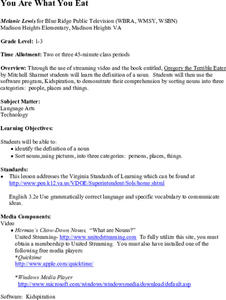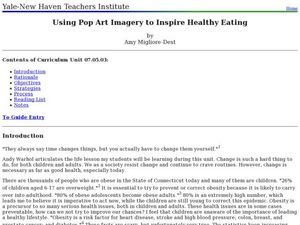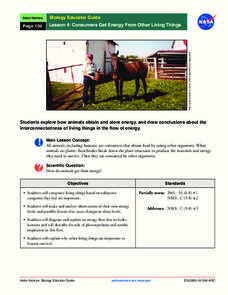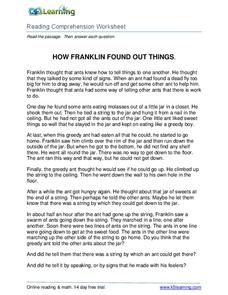Curated OER
Lady Bug Connect the Dots
In this Ladybug Girl worksheet, students connect the dots, sequence plant growth, circle things to eat, and more. Students complete 6 activities.
Curated OER
You Are What You Eat
Youngsters listen to the story of Gregory the Terrible Eater and write a similar story using the same pattern. In the new book, Herman is requested to eat things that are nouns. They must supply the correct part of speech for the class...
Poetry4kids
How to Write an Apology Poem
Put a silly spin on making amends with an apology poem. Budding poets think of a time they were made to apologize although they didn't mean it. They then turn their experience into a poem that offers details and ends with an explanation...
Prestwick House
To Kill a Mockingbird
Harper Lee's classic tale of Scout Finch's experience with prejudice and racism, To Kill a Mockingbird, provides the text for a 23-clue crossword puzzle.
Curated OER
Using Pop Art Imagery to Inspire Healthy Eating
Create a visual art project about obesity. In this art lesson, 8th graders research and explain the importance of eating healthy and exercise. They document their eating habits in their journal and analyze it.
American Museum of Natural History
Journey to the Bottom of the Sea
Follow the path to the sea floor. Pupils play an online interactive board game to reach the bottom of the sea. Participants must match descriptions of creatures to a property of water dealing with oxygen, food, light, or density to move...
K12 Reader
Adapting to Survive
Life science and language arts come together in a passage about animal adaptation. After kids learn about how organisms adapt to conditions in their environments, they complete five reading comprehension questions based on context clues...
Positively Autism
"What to Expect on the Fourth of July" Social Story
The social story "What to Expect on the Fourth of July" not only lets learners with autism know what to expect on this very American holiday, but also explains what behaviors are appropriate when at a fireworks display or picnic.
NASA
Consumers Get Energy From Other Living Things
How do plants and animals get their food? Learn about where energy comes from, how animals store energy, and aerobic respiration, in a lesson that allows scholars to diagram energy flows.
Polar Trec
Why Can’t I Eat This Fish?
Can turning on the television lead to toxins in the food supply? The lesson offers an opportunity for young scientists to complete guided research. A worksheet lists each question as well as the web page necessary to answer the question....
University of the Desert
Why Is Cultural Diversity a Positive Thing?
From more empathetic individuals to greater tolerance in government, learners explore the benefits of a culturally diverse world through a series of collaborative, discussion-based activities.
K5 Learning
How Franklin Found Out Things
Franklin learns about the world by making observations, and so do we! A short reading assignment prompts fourth graders to answer comprehension questions about a curious boy and what he notices.
NASA
Decomposers Get Energy From Dead Things
When life gives you mold, make penicillin. Scholars design an inquiry experiment to determine what causes rotting and mold growth. It also covers decomposers and the important role they play for other living things.
Positively Autism
What to Expect on Halloween
Halloween is a wonderful and highly social holiday, it includes dressing up, meeting new people, and of course candy! However, for a child with autism, Halloween might be a holiday of stress and uncertainty. Prepare your students for the...
Curated OER
Basic Needs of Living Things - Lesson One
An interesting way of teaching about basic needs of different organisms awaits your fourth graders. Pupils take part in class discussions and demonstrations which should lead to a greater understanding of how to determine basic needs. As...
Curated OER
Introduction to Nutrition
Fourth graders take a closer look at the foods they eat and the nutritional value of each. This lesson helps them see why foods are grouped together the way they are and what types of nutrition are provided by these food groups. They...
Curated OER
Introduce Vocabulary: Alexander, Who Use to be Rich Last Sunday (Viorst)
Although this vocabulary-in-context activity is focused on Judith Viorst's book Alexander, Who Use to Be Rich Last Sunday, the strategy can be applied to any book budding learners read with you. First, introduce the three new words you...
Pearson
Used To
Your class used to be confused about verb tenses, but now they understand more about the past tense! Practice the different ways to use used to in writing with a clear slideshow presentation, which includes negative and positive...
Read Works
How to Say “I Ruff You”
Who says you need a human to be your valentine on Valentine's Day? Give your dog-loving readers an inspiring perspective on how a sister givdes her brother a valentine from the family dog. They then answer 10 questions thatd involve...
Curated OER
Here's To Your Healthy Heart!
Students examine the primary controllable and uncontrollable factors that put one at greater risk for developing heart disease. Through discussion, research, physical tests, and questionnaires they determine whether or not they are at...
Curated OER
Growing Learners: A Multi-Disciplinary Approach to Investigating Plants and Flowers
Engage young scientists in these inquiry-based lesson ideas to spring into learning about nature.
Curated OER
Numbers 1-10
Fruit is a wonderful thing to eat and to count. Count from 1 to 10, each slide contains a number and the related amount of fruit to count. This is a wonderful exercise for early learners.
K12 Reader
What’s Eating You?
Introduce your class to producers, consumers, and pollinators with a reading passage. Class members read the text and respond to five related questions.
University of California
You Are What You Eat: Testing for Organic Compounds in Foods
We have all heard that we are what you eat, but what are we eating? An informative lesson opens with a discussion of the foods pupils have recently eaten. Then, young scientists perform four experiments on seven different foods to...

























